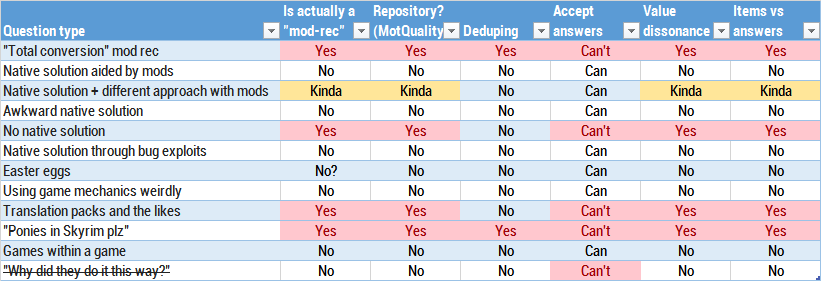This is a bit of a take on the discussion largely brought up by this question of last Fall, but to take a different approach to it. One might also gander at this oldie.
As an upfront note, any instance I use of "native" refers to the original game design, without any modifications.
Game-rec worked the way it did because it had a very specific entity that it embodied - acquiring new games to experience. Whether the goal was play, research, or what else, they all manifested in the same fashion. This is why we were able to really produce a general ruling on the class as a whole - it's straight forward and identifiable, we don't build repositories of games.
I do not believe that mod rec is so simple. I think it is, in fact, ambiguous and encompasses too much to manage in a single class - and making our rules based on this feels confusing and entangled. And this lies a bit in the fact that, as tzenes wisely pointed out, "mod" is itself ambiguous and refers to many classes of elements. The two most notable of which are "Standalone Game Mods" which are mods of a game distinct enough to be their own game (the original DotA, Parallel Worlds for LttP, etc.), and "Modifications to add elements to a game" that are things like, well, what a lot of people be doin' to Skyrim and Minecraft.
"mod rec" as applied to the former is, essentially, Game Rec - the Reckoning, the vile sequel meant to turn our innards to copper. Or, in less inane terminology, it is identical to asking for new games in exactly the same way that asking for new games is asking for new games. Because those mods are standalone games, and trying to build a repository of them falls under the same class we already dealt with. There's almost no questioning that it would be odd to permit these when we have a standing ban on game rec.
In the latter, though, "mod rec" is... actually diverse. Because the inquiries for it are variegated and contain a number of different types. It encompasses a much different problem space, which includes things like "subverting obstacles", "introducing new gameplay elements", "rebalancing the original game", and other such. There are a lot of different kinds of problems, and trying to group them all into one kind of category to apply a wide policy on is detrimental, in my opinion. It's a distraction in the same way that "list question" is a distraction to logical enforcement of the rules.
People should look at the core question, not to be confused with the motivation behind asking a question. "How can I land a successful hit with Real Impact?" is identical in core to "What combos exist that can lead into Real Impact?" - the core problem being how to connect with the attack. This same logic is something to apply when the core problem's solution space may consist partially or entirely of mods to a game.
"How do I Wavedash in Brawl?", "Can I make a functional cannon in Minecraft?", "How do I track when my cooldowns are up?", and many other kinds of core questions like these. They embody very isolated problem spaces, some of which do not exist in the game's native programming at all while others are more effectively done by mods, while yet others just offer a complete alternative option than the inherent options in the game.
Basically, in my eyes, trying to fit everything into one category of "mod rec" for judgment is like a subset of classifying our site as "solution rec", because that's what we do, people ask us for recommendations on how to solve a problem. It's the nature of that problem that defines whether we accept it or not, and there's a lot of different natures out there.
Some of the problem spaces that turn up where the phrase "mod rec" rears its ugly head would be:
- The aforementioned standalone game mod rec
- Problems that can entirely be solved natively, but which a mod might make it easier
- Problems that can entirely be solved natively, but which a mod provides an alternative or more direct approach
- Problems that can be solved exceptionally awkwardly when in the native game
- Problems that are not designed with the intention of being solved natively
- Problems that are designed explicitly that cannot be done (You can't get General Leo into your party)
- Accessing easter eggs (You might consider seeing John Romero as a better illustration)
- Wrench Tennis and other elements not intentionally designed in a wieldy way
- Problems involving the lack of English in Simon's Quest
- Problems involving altering the experience of gameplay as a whole
- Problems involving simulating a different game experience than is natively intended, whether or not it is natively possible
- Problems regarding the apparent design of the game and the means to get around its shortcomings or obstacles
There's a lot more but I hope the diversity can be seen here.
To that end, I ask that we don't think "Do we want to allow people to ask about mods?", but rather start to think about questions on these cores. Do we want to allow questions about problems that the game deliberately doesn't want you to address? Are mod-based problem spaces fundamentally identical to glitch-based problem spaces? Do we want to allow questions about altering the native game experience? Are alternatives to a game's native design appreciated? Those kind of thoughts, I think, are more useful to identifying what we should or should not allow than trying to group it all in one umbrella that not only masks what possible issues and natures are present, but also conflates the entire thing with an ultimately unrelated issue.

